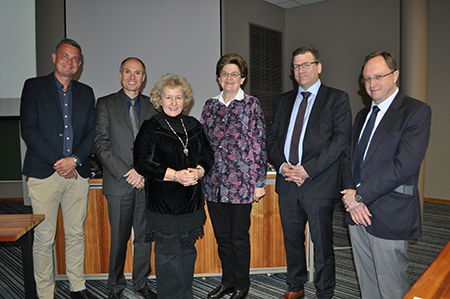Hypertension, strokes and heart disease – the silent killers. Have you ever heard that a healthy body houses a healthy brain? The reverse is actually true. Therefore the Hypertension in Africa Research Team (HART) of the North-West University (NWU) discussed the disturbance of the brain-heart symphony under the guidance of experts on 23 May.
The symposium was presented in collaboration with Mediclinic Potchefstroom for members of the Health Professions Council of South Africa, NWU academics and postgraduate students.
The theme was “Brain-Heart cross talk and Cardiometabolic health”, or rather the brain-heart symphony.
“The prevention of diseases like hypertension, strokes, heart diseases, as well as type 2 diabetes, is a global challenge. In spite of this, the role of emotional stress as a cause of these diseases has not yet been examined thoroughly in sub-Saharan Africa,” explained Prof Leoné Malan of HART.
“The more emotional stress one experiences, the greater the challenge is for the brain to keep the balance. During this process, lifestyle factors like social support by family and friends, recreation, diet, physical activity, alcohol and smoking habits play a role because they are coping mechanisms to keep stress in check or to alleviate stress. It emphasises the choice of a balanced lifestyle. If these coping mechanisms are unsuccessful, the brain-heart health declines and polygenetic risks increase,” she added.
A polygenetic factor like height can hold a greater risk for heart attacks and stroke in combination with lifestyle factors because it disrupts important neurochemical substances in the brain and heart. The results can, among other things, be emotional stress, central obesity (waist circumference), elevated blood pressure, clotting disorders and migraine attacks.
Collaborators of the “Sympathetic activity and Ambulatory Blood Pressure in Africans (SABPA)” prospective study addressed the approximately 120 guests. These speakers were renowned medical doctors and researchers with specialisation in internal medicine (Prof Olle Melander, Sweden), cardiology (Prof Martin Magnusson, Sweden), psychiatry (Prof Roland von Känel, Switzerland) and neurology (Dr Johan Smuts, South Africa).
Recommendations that were made during the symposium were:
- Diminishing polygenetic risk by drinking sufficient water to control volume (blood pressure) and maintain neurochemical hormone balance;
- Being physically active at least once or twice a week, even if it is only to walk for 30 minutes;
- Having a balanced lifestyle in order to elevate high-density lipoprotein (HdL) cholesterol for healthy blood vessels;
- Reducing stress by learning stress-handling techniques in order to restrict the impact of stress. The value of a good support network of family and friends cannot be overestimated;
- Avoiding excessive stress that could contribute to blood-clotting disorders, migraine and stroke. Use the correct medication for migraine, and get enough good quality sleep.
Migraine in combination with an aura (excessive visual images like flickering lights, zigzag lines or stars) is an indicator of an increased risk for ischemic heart disease – especially in women. According to Prof Malan, balance is the golden password, and other than polygenetic factors like height, the individual is to a great extent in control themselves. “Balance your heart-brain symphony by making healthy lifestyle choices.”
The symposium was made possible by the following sponsors: Bluetek, Roche Diagnostics and Angels (Boehringer-Ingelheim).

Prof Martin Magnusson, Prof Roland von Känel, Prof Leoné Malan, Prof Susan Visser (Vice Rector: Research and Planning), Prof Olle Melander and Dr Johan Smuts.

Blake van Aswegen, manager of Potchefstroom Mediclinic
